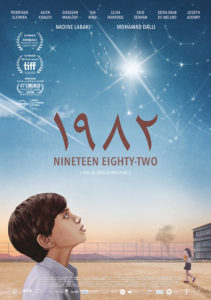
On Sunday, January 31st, 2021, Al-Bustan had the honor to host esteemed guests, director Oualid Mouaness and Egyptian film critic Joseph Fahim, for an intimate virtual discussion on Mouaness’ acclaimed debut feature film, 1982. The conversation took place following Al-Bustan’s first at-home film screening. Our audience shared their love of the film throughout the discussion. In anticipation, one audience member commented:
“Loved the film – especially the cinematography and the how the impending doom was seen through the eyes of the kids, teachers, and parents.
Fahim opened the discussion by taking the audience through the progression of Mouaness’ career as a producer, writer, and director of music videos, documentaries, and short films. Mouaness argued this path was a necessary preparation for him to approach the making of a film like 1982. In the film Mouaness wanted to represent the Lebanon “…that not many people see”. Achieving this worthy goal took Mouaness eight years. As for the subject matter? Mouaness wanted to show how lives were interrupted by a conflict that is so often depicted on a level separate from daily life. As Mouaness simply explained, “It [the story] needed to be told. And it needed to show us, as Lebanese people, for how we experienced this because not everybody always participates in a war…yet we are impacted.”
Contextualizing 1982 within recent trends in Arab cinema, Fahim asked Mouaness if he was worried about comparisons with other films on the Israeli invasion of Lebanon or its relevancy today when so much has happened between then and now. While acquiescing that, in some ways, 1982 is a war story, Mouaness explained that it is also a love story which is perpetually relevant. This sentiment was shared by one audience member who wrote:
“One of the most beautiful films I’ve seen in a long time – a powerful and sensitive young love story set against a heartbreaking backdrop of impending war”
The discussion took on a lighter note as Mouaness recalled his own experience with writing love notes in his childhood and his preoccupation with the anime superhero Grendizer. The audience learned that much of the film was inspired by Mouaness’ own experiences and that the film was even shot at the school that the director attended.
“You can decide if it’s a war film or its not, it is actually a war film of sorts, but it’s not just another war film, it’s its own human experience of something… It’s the story of a kid in this situation, it’s the story of a kid in the scheme of this bigger thing… When a story becomes about people it loses its irrelevance, it’s always relevant. “
Fahim ended the discussion with the comments from our audience. Mouaness spoke of the delicate and subtle political quality of the film, which shows the ruthlessness of war, causing indiscriminate harm, disrupting life. He also addressed the ending of the film, in which a robot appears as a protector of Beirut. Mouaness explained that there is no human answer to this conflict. The conflict demands a miracle and the film demanded a solution born of Wissam’s imagination. Mouaness beautifully explained, “This is the beauty of cinema….it enables you to imagine the unimaginable…it [the ending] is the wishful history that we never had.”
Delicately balanced between magical realism and a grounded reality throughout the film, 1982 sinks the audience into the world of the schoolhouse to allow for such an ex-machina ending. The input of the children actors’ instinct contributed to the grounded reality of the film. Mouaness recounted one moment in particular, when war tanks roll past the fence, where the actors’ choice contributed to the grounding of the film in a way that Mouaness couldn’t imagine as an adult. The environment of the set was carefully constructed to achieve the rich depiction of the world of children seen in 1982, which captured the attention of its audience. One viewer wrote:
“…I love the focus on school as the most quotidian place where people find ways to live with and respond to this kind of violence…”
The conversation ended, as it seems all conversations do these days, with the impact of COVID-19. Mouaness explained, while the film is made to be projected, he knows that people who would not normally see 1982 are able to do so because of our circumstances. If you haven’t had a chance to view 1982, you can rent the film on various streaming services, local and national. Afterwards, watch the discussion between Oualid Mouaness and Joseph Fahim below, and keep an eye out for future film screenings with Al-Bustan!
Watch the discussion here:


